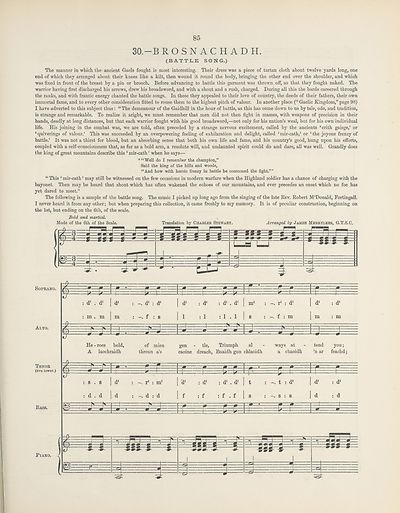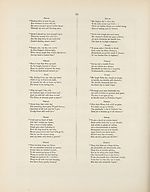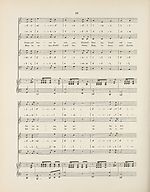Glen Collection of printed music > Printed music > Killin collection of Gaelic songs
(101) Page 85 - Brosnachadh (Battle song)
Download files
Complete book:
Individual page:
Thumbnail gallery: Grid view | List view

85
30. —B ROSNACHADH.
(BATTLE SONG.)
The manner in which the ancient Gaels fought is most interesting. Their dress was a piece of tartan cloth about twelve yards long, one
end of which they arranged about their knees like a kilt, then wound it round the body, bringing the other end over the shoulder, and which
was fixed in front of the breast by a pin or brooch. Before advancing to battle this garment was thrown off, so that they fought naked. The
warrior having first discharged his arrows, drew his broadsword, and with a shout and a rush, charged. During all this the bards careered through
the ranks, and with frantic energy chanted the battle songs. In these they appealed to their love of country, the deeds of their fathers, their own
immortal fame, and to every other consideration fitted to rouse them to the highest pitch of valour. In another place (“ Gaelic Kingdom,” page 98)
I have adverted to this subject thus: “ The demeanour of the Gaidhill in the hour of battle, as this has come down to us by tale, ode, and tradition,
is strange and remarkable. To realize it aright, we must remember that men did not then fight in masses, with weapons of precision in their
hands, deadly at long distances, but that each warrior fought with his good broadsword,—not only for his nation’s weal, but for his own individual
life. His joining in the combat was, we are told, often preceded by a strange nervous excitement, called by the ancients ‘crith gaisge,’ or
‘ quiverings of valour.’ This was succeeded by an overpowering feeling of exhilaration and delight, called ‘ mir-cath,’ or ‘ the joyous frenzy of
battle.’ It was not a thirst for blood, but an absorbing sense that both his own life and fame, and his country’s good, hung upon his efforts,
coupled with a self-consciousness that, as far as a bold arm, a resolute will, and undaunted spirit could do and dare, all was well. Grandly does
the king of great mountains describe this ‘ mir-cath ’ when he says—
‘ “Well do I remember the champion,”
Said the king of the hills and woods,
“And how with heroic frenzy in battle he consumed the fight.”’
“ This ‘ mir-cath ’ may still be witnessed on the few occasions in modern warfare when the Highland soldier has a chance of charging with the
bayonet. Then may be heard that shout which has often wakened the echoes of our mountains, and ever precedes an onset which no foe has
yet dared to meet.”
The following is a sample of the battle song. The music I picked up long ago from the singing of the late Eev. Eobert M‘Donald, Fortingall.
I never heard it from any other; but when preparing this collection, it came freshly to my memory. It is of peculiar construction, beginning on
the 1st, but ending on the 6th, of the scale.
Bold and martial.
Mode of the 6th of the Scale. Translation by Charles Stewart. Arranged by James Merrylees, G.T.S.C.
30. —B ROSNACHADH.
(BATTLE SONG.)
The manner in which the ancient Gaels fought is most interesting. Their dress was a piece of tartan cloth about twelve yards long, one
end of which they arranged about their knees like a kilt, then wound it round the body, bringing the other end over the shoulder, and which
was fixed in front of the breast by a pin or brooch. Before advancing to battle this garment was thrown off, so that they fought naked. The
warrior having first discharged his arrows, drew his broadsword, and with a shout and a rush, charged. During all this the bards careered through
the ranks, and with frantic energy chanted the battle songs. In these they appealed to their love of country, the deeds of their fathers, their own
immortal fame, and to every other consideration fitted to rouse them to the highest pitch of valour. In another place (“ Gaelic Kingdom,” page 98)
I have adverted to this subject thus: “ The demeanour of the Gaidhill in the hour of battle, as this has come down to us by tale, ode, and tradition,
is strange and remarkable. To realize it aright, we must remember that men did not then fight in masses, with weapons of precision in their
hands, deadly at long distances, but that each warrior fought with his good broadsword,—not only for his nation’s weal, but for his own individual
life. His joining in the combat was, we are told, often preceded by a strange nervous excitement, called by the ancients ‘crith gaisge,’ or
‘ quiverings of valour.’ This was succeeded by an overpowering feeling of exhilaration and delight, called ‘ mir-cath,’ or ‘ the joyous frenzy of
battle.’ It was not a thirst for blood, but an absorbing sense that both his own life and fame, and his country’s good, hung upon his efforts,
coupled with a self-consciousness that, as far as a bold arm, a resolute will, and undaunted spirit could do and dare, all was well. Grandly does
the king of great mountains describe this ‘ mir-cath ’ when he says—
‘ “Well do I remember the champion,”
Said the king of the hills and woods,
“And how with heroic frenzy in battle he consumed the fight.”’
“ This ‘ mir-cath ’ may still be witnessed on the few occasions in modern warfare when the Highland soldier has a chance of charging with the
bayonet. Then may be heard that shout which has often wakened the echoes of our mountains, and ever precedes an onset which no foe has
yet dared to meet.”
The following is a sample of the battle song. The music I picked up long ago from the singing of the late Eev. Eobert M‘Donald, Fortingall.
I never heard it from any other; but when preparing this collection, it came freshly to my memory. It is of peculiar construction, beginning on
the 1st, but ending on the 6th, of the scale.
Bold and martial.
Mode of the 6th of the Scale. Translation by Charles Stewart. Arranged by James Merrylees, G.T.S.C.
Set display mode to: Large image | Zoom image | Transcription
Images and transcriptions on this page, including medium image downloads, may be used under the Creative Commons Attribution 4.0 International Licence unless otherwise stated. ![]()
| Special collections of printed music > Glen Collection of printed music > Printed music > Killin collection of Gaelic songs > (101) Page 85 - Brosnachadh (Battle song) |
|---|
| Permanent URL | https://digital.nls.uk/108077073 |
|---|
| Description | Scottish songs and music of the 18th and early 19th centuries, including music for the Highland bagpipe. These are selected items from the collection of John Glen (1833 to 1904). Also includes a few manuscripts, some treatises, and other books on the subject. |
|---|
| Description | The Glen Collection and the Inglis Collection represent mainly 18th and 19th century Scottish music, including Scottish songs. The collections of Berlioz and Verdi collected by bibliographer Cecil Hopkinson contain contemporary and later editions of the works of the two composers Berlioz and Verdi. |
|---|

